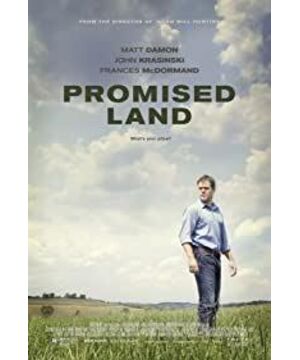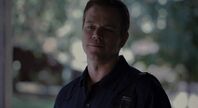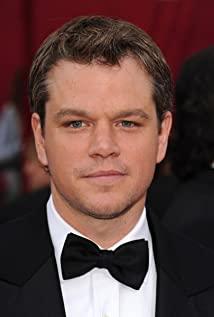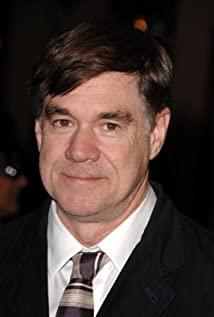Basically watched all of Matt Damon's movies. When I saw a lot of comments saying that the film Wen Tun, which he rarely wrote by himself, was mediocre, I decided to watch it last, because I think the script he wrote must have value and should be watched slowly. And before I watched this movie, I watched some of GVS's works, such as literary films like Idaho, Elephant, and their last collaboration with Jerry, and the slightly more commercialized soul catcher also watched it several times. I have to say that gentle and gentle is the style of GVS, and I am also ready to watch this slow-paced promised land.
It’s a pity that I didn’t plan to watch it at the time when I watched the low ratings, so I read most of the film reviews and understood the plot without hesitation, so I didn’t experience the climax brought about by that reversal. But this does not affect my aftertaste and thinking after watching the movie. As many film critics have said, what this film really wants to express is not environmental protection, but a reflection on modernization. I think he wants to express a lot in the movie, and it is right to choose a gentle rhythm. There is also a lot of blank space. It’s up to you to see different opinions. This leaves room for the aftertaste after watching, and the problems in the film are happening in every country. When the aftertaste is connected to the reality and thinking, it is more bitter.
I think the points I have come out of aftertaste are very interesting:
1 The environmentalist is fake, but what he says is true. The protagonist's purposeful deception is in contrast to the purposeful frankness of the environmentalists. The unscrupulous measures of the big companies are shocking, and the poor villagers suffer from the enemy. At the same time, the pollution truth revealed by the environmentalists made me feel the protagonist's guilt. The "i am not a bad guy" he often said was more like his own justification.
2 Large companies are old and hot, and the protagonist without fake environmentalists may not necessarily be the dominant party. When competing with environmentalists, the way the protagonist came up with to reverse the situation was to hold a carnival and use money to persuade them powerfully. There were simple supporters to help him. This plan seemed to be a play, but in the end it was completely ruined by a heavy rain. There was a scene when he was standing by the river with the girl, and it was obvious that it was going to rain. The male protagonist who made this plan really didn't think about it. This proves that the mistrust of the company at the beginning is correct, and it further shakes the protagonist. He may indeed not be famous.
3 Under the combination of many factors, the old man's conversation with him in the yard made him start to really change. At first, the propaganda of environmentalists was like a broken bamboo, then his girl was abducted, and the unexpected weather counterattack plan was defeated. At this time, he felt like a loser, at the most vulnerable time. At this time, the old man greeted him and asked about his hometown. It turned out that he had escaped from a similar village at the end of the road. He was a homeless person. At the end of the chat, the old man threw out the sentence "I am worried about their future", and put it together with the farmers who wanted to pass on the land, the villagers who bought sports cars with the money, and the old man asking him where they were going. The seed of resistance in the fragile and struggling self-doubt should have begun to sprout, and he and the old man are standing on the same side. He can hold onto this land, keep the simple people here, and seek a new way out, because once it is sold to the company, it will be forever. This is not entirely related to love.
4 He just held the village temporarily. The real problem has not been solved, and his resistance is powerless. From the moment he was fired to see the girl at the end of the film, I didn't relax in my heart, only bitter. He must not only endure poverty, but also face the inevitable decline of the town, unless there is a better way than to trade the environment for the economy, but I can't think of a better solution that he can do at the moment. Judging from the acceptance and even happiness of some villagers towards the contract, it will be sooner or later that the environment of the small town will be sold.
The cost of modernization is always high, and people often choose the economy when facing the opposition between the environment and the economy, especially for those on the verge of economic collapse. This has also created more and more homeless people. The relationship between the protagonist in the film and the work he does is very ironic. The homeless people create more homeless people.
I'm a little sleepy when I write, my writing isn't good, and my consciousness isn't clear, so let's do it. In any case, I think the rhythm of this movie is very good. The cute script is indeed very frank and plainly speaking about the problems he sees. There are places for direct expressions and spaces, and there is no solution openly. Solution, because these problems are now almost impossible to solve. I have watched a lot of movies recently, and there are also many of them that have too much stuff and the center of gravity is unbalanced and the rhythm is unstable. Although this script is plain, after reading it, you will feel that the things you want to talk about are arranged properly. I have to say that he still has the background in the screenwriting of the soul catcher.
View more about Promised Land reviews











